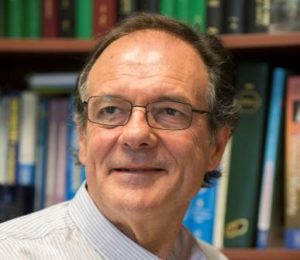
A groundbreaking nanoparticle system which stimulates the growth of microalgae – a valuable resource used in the production of biofuels and medical compounds – has been developed by a team of Australian scientists, including Flinders University clean technology expert Professor Colin Raston.
The technique, developed in collaboration with researchers from the University of Western Australia, creates an optical nanofilter which enhances the formation and yield of algae photopigments, namely chlorophyll, by altering the wavelengths of light absorbed by the algae.
Using algae growing in flasks, the scientists surrounded the flasks with a solution of gold and silver nanoparticles that were tweaked in size and composition to harness light wavelengths most favourable for microalgae growth and formation of photopigments.
While light is essential for algae growth, too much light, or certain wavelengths of light, can damage the algae and inhibit growth.
Professor Raston, the SA Premier’s Professorial Research Fellow in Clean Technology, said the novel technique enhances the wavelengths reaching the algae which involves “backscattering” of wavelengths which the algae can use, resulting in improved growth.
“It’s not as simple as increasing light intensity because the algae will bleach and get toxic stress through the accumulation of oxygen,” Professor Raston said.
“But by putting light in the nanoparticles at a wavelength the algae can handle it matches the light the algae are using in the flask, and the algae then absorbs that light which stimulates growth,” he said.
“The system uses nanoparticles placed in a separate flask on the outside of the algae flask which means the nanoparticles are not in direct contact with the algae, therefore avoiding any toxicological issues and contamination.”
Microalgae is a valuable marine resource used to generate bioenergy and biomass, which has a variety of environmentally sustainable applications including biofuels, medical antioxidants and anti-inflammatory agents, natural food and soap colourants, cosmetic agents and feed supplements in aquaculture.
Professor Raston said the new technique could ultimately boost the production of commercially viable products.
“The speed and efficiency at which microalgae grow is currently limiting them from being turned into commercially viable products so it’s hoped that if we can increase the yield of algae we can produce valuable algae-to-energy products at a much faster rate.
“It’s a significant advancement in developing technologies to optimise the growth of algae for renewable fuels, specialty chemicals and value-added chemical compounds for applications in the pharmaceutical industry.”
The research – undertaken in collaboration with Dr Ela Eroglu, Dr Paul Eggers and Winthrop Professor Steven Smith from the University of Western Australia – has just been published in the international peer-reviewed journal Green Chemistry.

